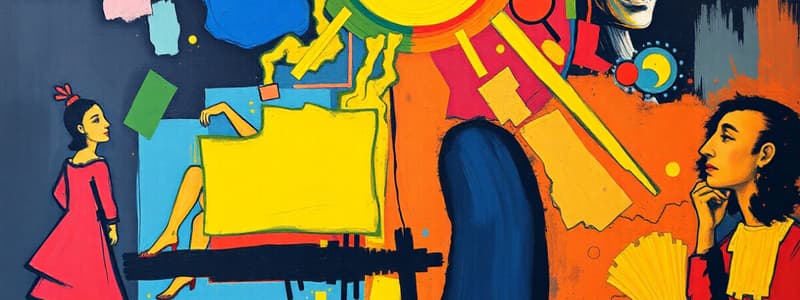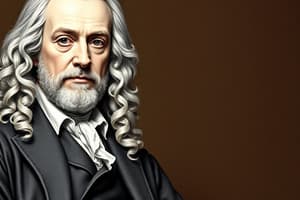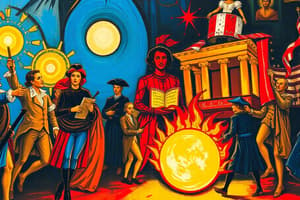Podcast
Questions and Answers
What key belief did Thomas Hobbes hold regarding government?
What key belief did Thomas Hobbes hold regarding government?
- He supported a monarch with absolute power. (correct)
- He advocated for a democracy with elected officials.
- He believed in a system of checks and balances.
- He argued for the abolition of the monarchy.
Which philosopher argued that 'man is born free, yet everywhere he is in chains'?
Which philosopher argued that 'man is born free, yet everywhere he is in chains'?
- Rousseau (correct)
- John Locke
- Montesquieu
- Voltaire
Which of the following was NOT a reform implemented by Frederick of Prussia?
Which of the following was NOT a reform implemented by Frederick of Prussia?
- Granting religious freedoms
- Reducing censorship
- Introducing a new legal system (correct)
- Abolishing torture
What was a significant influence of Enlightenment thinking on the American Revolution?
What was a significant influence of Enlightenment thinking on the American Revolution?
Which of the following accurately describes Voltaire's stance during the Enlightenment?
Which of the following accurately describes Voltaire's stance during the Enlightenment?
Which enlightenment ruler is known for introducing freedom of the press?
Which enlightenment ruler is known for introducing freedom of the press?
Which statement best summarizes Montesquieu's influence?
Which statement best summarizes Montesquieu's influence?
What is a central tenet of Immanual Kant's philosophy in the Enlightenment?
What is a central tenet of Immanual Kant's philosophy in the Enlightenment?
What principle did Locke assert regarding an unjust ruler?
What principle did Locke assert regarding an unjust ruler?
What did the Declaration of Independence (DOI) emphasize about rights?
What did the Declaration of Independence (DOI) emphasize about rights?
What was a major outcome of the Constitutional Convention?
What was a major outcome of the Constitutional Convention?
Which economic principle did Adam Smith promote?
Which economic principle did Adam Smith promote?
What was the purpose of the Navigation Act?
What was the purpose of the Navigation Act?
What was the significance of the Bill of Rights in the new American government?
What was the significance of the Bill of Rights in the new American government?
What economic system was questioned during the revolutionary era?
What economic system was questioned during the revolutionary era?
What major issue began to be scrutinized during the revolutionary era?
What major issue began to be scrutinized during the revolutionary era?
What event marked the first act of defiance against King Louis XVI?
What event marked the first act of defiance against King Louis XVI?
Which economic advisor was employed by Louis XVI but later dismissed after recommending taxing the second estate?
Which economic advisor was employed by Louis XVI but later dismissed after recommending taxing the second estate?
What action did the mob take in July 1789 in response to Louis XVI's orders?
What action did the mob take in July 1789 in response to Louis XVI's orders?
What significant document was created in August 1789?
What significant document was created in August 1789?
What was the fate of Louis XVI following the revolution?
What was the fate of Louis XVI following the revolution?
What did Robespierre begin during the Reign of Terror?
What did Robespierre begin during the Reign of Terror?
Which of the following best describes the fate of prisoners in Paris during the autumn of 1792?
Which of the following best describes the fate of prisoners in Paris during the autumn of 1792?
What major action did France take in April 1792 concerning Austria?
What major action did France take in April 1792 concerning Austria?
Who is primarily associated with the Reign of Terror during the French Revolution?
Who is primarily associated with the Reign of Terror during the French Revolution?
What was the primary motivation for Charlotte Corday's assassination of Jean Paul-Marat?
What was the primary motivation for Charlotte Corday's assassination of Jean Paul-Marat?
Which group would have preferred a constitutional monarchy rather than the extreme changes brought by the revolution?
Which group would have preferred a constitutional monarchy rather than the extreme changes brought by the revolution?
Which social class in France was exempt from paying taxes during the old regime?
Which social class in France was exempt from paying taxes during the old regime?
What significant event occurred in 1795 that marked a shift in the governance of France?
What significant event occurred in 1795 that marked a shift in the governance of France?
Which group during the revolution became more totalitarian than the monarchy they opposed?
Which group during the revolution became more totalitarian than the monarchy they opposed?
What was a common belief held by the Girodins about the Jacobins' actions?
What was a common belief held by the Girodins about the Jacobins' actions?
What effect did Louis XVI's support of the American colonies have on public perception of him?
What effect did Louis XVI's support of the American colonies have on public perception of him?
What did the Bastille symbolize in the context of the French Revolution?
What did the Bastille symbolize in the context of the French Revolution?
What was the primary purpose of the National Assembly during the French Revolution?
What was the primary purpose of the National Assembly during the French Revolution?
Which document defined the individual and collective rights of all estates as universal?
Which document defined the individual and collective rights of all estates as universal?
How were the Angry Fish Wives involved in the French Revolution?
How were the Angry Fish Wives involved in the French Revolution?
What role did the guillotine play in the French Revolution?
What role did the guillotine play in the French Revolution?
Which leader of the French Revolution was known for his radical approach and responsibility for mass executions?
Which leader of the French Revolution was known for his radical approach and responsibility for mass executions?
What was Jacques Necker's role during the events leading to the French Revolution?
What was Jacques Necker's role during the events leading to the French Revolution?
What concept related to human behavior did Jean Jacques Rousseau advocate that influenced revolution leaders?
What concept related to human behavior did Jean Jacques Rousseau advocate that influenced revolution leaders?
What was a primary reason for the American Revolution?
What was a primary reason for the American Revolution?
How did the French Revolution differ in its approach to religion compared to the American Revolution?
How did the French Revolution differ in its approach to religion compared to the American Revolution?
What major societal issue contributed to the discontent leading to the French Revolution?
What major societal issue contributed to the discontent leading to the French Revolution?
What was a significant reaction among the French revolutionaries during the Reign of Terror?
What was a significant reaction among the French revolutionaries during the Reign of Terror?
Which of the following accurately describes the American view of religion during their revolution?
Which of the following accurately describes the American view of religion during their revolution?
What characterized the peasants' desires during the French Revolution in contrast to the elites?
What characterized the peasants' desires during the French Revolution in contrast to the elites?
Which church was notably connected to the monarchy during the French Revolution?
Which church was notably connected to the monarchy during the French Revolution?
Which of the following best describes a major result of the American revolutionary unity?
Which of the following best describes a major result of the American revolutionary unity?
What was one result of Robespierre's actions during the French Revolution?
What was one result of Robespierre's actions during the French Revolution?
What drove the widespread cynicism towards the monarchy before the French Revolution?
What drove the widespread cynicism towards the monarchy before the French Revolution?
Flashcards
Enlightenment
Enlightenment
A philosophical movement emphasizing reason and individual rights, influencing the American Revolution.
John Locke
John Locke
An Enlightenment philosopher advocating for limited government and natural rights.
Thomas Hobbes
Thomas Hobbes
An Enlightenment philosopher supporting absolute monarchy, contrasting with Locke.
American Revolution
American Revolution
Signup and view all the flashcards
Natural Rights
Natural Rights
Signup and view all the flashcards
Thomas Jefferson
Thomas Jefferson
Signup and view all the flashcards
Declaration of Independence
Declaration of Independence
Signup and view all the flashcards
Enlightened Monarchs
Enlightened Monarchs
Signup and view all the flashcards
Estates General
Estates General
Signup and view all the flashcards
Tennis Court Oath
Tennis Court Oath
Signup and view all the flashcards
Bastille
Bastille
Signup and view all the flashcards
Declaration of the Rights of Man
Declaration of the Rights of Man
Signup and view all the flashcards
Jacobin Club
Jacobin Club
Signup and view all the flashcards
Reign of Terror
Reign of Terror
Signup and view all the flashcards
Committee of Public Safety
Committee of Public Safety
Signup and view all the flashcards
Guillotine
Guillotine
Signup and view all the flashcards
DOI's Influence on Government
DOI's Influence on Government
Signup and view all the flashcards
Navigation Acts' Impact
Navigation Acts' Impact
Signup and view all the flashcards
Stamp Act: First Tax?
Stamp Act: First Tax?
Signup and view all the flashcards
Constitutional Convention Aim
Constitutional Convention Aim
Signup and view all the flashcards
Checks and Balances
Checks and Balances
Signup and view all the flashcards
Bill of Rights: Protecting Citizens
Bill of Rights: Protecting Citizens
Signup and view all the flashcards
Adam Smith & the Economy
Adam Smith & the Economy
Signup and view all the flashcards
Slavery's First Challenge
Slavery's First Challenge
Signup and view all the flashcards
French Revolution Factions
French Revolution Factions
Signup and view all the flashcards
Jacobins
Jacobins
Signup and view all the flashcards
Girodins
Girodins
Signup and view all the flashcards
Royalists
Royalists
Signup and view all the flashcards
First Estate
First Estate
Signup and view all the flashcards
Second Estate
Second Estate
Signup and view all the flashcards
Third Estate
Third Estate
Signup and view all the flashcards
Louis XVI's Impact on Revolution
Louis XVI's Impact on Revolution
Signup and view all the flashcards
National Assembly
National Assembly
Signup and view all the flashcards
Angry Fish Wives
Angry Fish Wives
Signup and view all the flashcards
Maximilien Robespierre
Maximilien Robespierre
Signup and view all the flashcards
George Danton
George Danton
Signup and view all the flashcards
Marat
Marat
Signup and view all the flashcards
American Revolution's Cause
American Revolution's Cause
Signup and view all the flashcards
American Revolution's Unity
American Revolution's Unity
Signup and view all the flashcards
French Revolution's Cause
French Revolution's Cause
Signup and view all the flashcards
French Revolution's Divided Response
French Revolution's Divided Response
Signup and view all the flashcards
French Revolution's Role of Religion
French Revolution's Role of Religion
Signup and view all the flashcards
How American Revolution Viewed Religion
How American Revolution Viewed Religion
Signup and view all the flashcards
French Revolution's Moral Vacuum
French Revolution's Moral Vacuum
Signup and view all the flashcards
American Revolution's Moral Order
American Revolution's Moral Order
Signup and view all the flashcards
French Revolution's Moral Vacuum Impact
French Revolution's Moral Vacuum Impact
Signup and view all the flashcards
Study Notes
American Revolution
- Thirty years' war between Catholic and Protestant followed Luther's ideas.
- Led to Protestant empowerment of the individual and the Enlightenment.
- Philosophers like John Locke and Thomas Hobbes were influential during the Age of Reason.
- Hobbes believed in a monarch with absolute power. Locke was not anti-monarch but believed monarchs should have restrictions.
French Philosophers
- Voltaire was one of the first public figures in his time to openly declare atheism.
- He was enthralled with intellectual freedom in England and advocated an enlightened monarch.
- Montesquieu believed the British system was the best, influenced by Locke's natural rights concept.
- Rousseau believed "man is born free, yet everywhere he is in chains".
- He argued for equality and the abolishment of the class system.
- He believed mankind was corrupted by society, not by personal sin.
The Enlightenment
-
Immanuel Kant defined reason as universal and independent of experience.
-
Enlightenment thinking, by cutting free from historical constraints, can produce crazy notions.
-
Important enlightened rulers include Frederick of Prussia and Joseph of Austria.
-
Frederick of Prussia granted religious freedom, reduced censorship, improved education and reformed the justice system, abolishing torture.
-
Joseph of Austria introduced freedom of the press and abolished serfdom.
-
Catherine of Russia also supported freedom of worship and abolished serfdom.
The Influence of the Enlightenment on the American Revolution
- Leaders like Thomas Jefferson used Enlightenment ideals to justify independence.
- Jefferson's Declaration of Independence (1776) reflected Enlightenment arguments for natural rights.
- John Locke asserted the right of people to rebel against unjust rulers.
- The Declaration of Independence emphasized that governments are formed to secure rights stemming from the people.
- The Navigation Acts prevented colonists from selling products to other countries, except Britain, and imposing high taxes on various goods.
- The Stamp Act was the first British tax on American colonies, needing printed materials produced in London.
American Economic System
- Colonies faced old economic models of monarch-led systems that dictated production and protected local goods.
- Adam Smith questioned this system, contributing to the new American economy.
- Smith believed individuals should be free to choose what to produce and sell for profit. He argued that wealth was not fixed but could increase through this freedom.
The French Revolution: Timeline
- 1770: Louis XVI marries Marie Antoinette.
- 1774: Louis XV dies; Louis XVI becomes king.
- 1789: France faces severe financial crisis.
- Estates General convened: The Third Estate (commoners) formed the National Assembly (protesting).
- 1789: Louis XVI fired Jacques Necker, provoking the French Revolution.
- July 1789: Storming of the Bastille.
- August 1789: Declaration of the Rights of Man written.
- 1789 Fall: The Bourbons were forced to relocated to Paris under house arrest.
- June 1791: Louis XVI and Marie Antoinette attempted to flee but were stopped.
- April 1792: France declared war on Austria.
- 1792: Reign of Terror caused mass murders of French citizens.
- 1793: Louis XVI was executed.
- 1793: Marie Antoinette was executed.
- 1794: Danton and Robespierre executed.
- 1795: The Directory was established, revising laws and creating a new constitution.
Factions Among the Revolution
- Jacobins, Girodins, Royalists emerged during the revolution.
- Jacobins were radical, and Girodins were moderate.
- Jacobins became responsible for the Reign of Terror.
- Royalists favored the king.
Role of Religion in the French and American Revolutions
- American Revolution: Americans didn't associate religion with government; saw revolution as God-ordained.
- French Revolution: Catholic Church was so connected to the monarchy. Robespierre attempted to abolish religion.
Studying That Suits You
Use AI to generate personalized quizzes and flashcards to suit your learning preferences.




